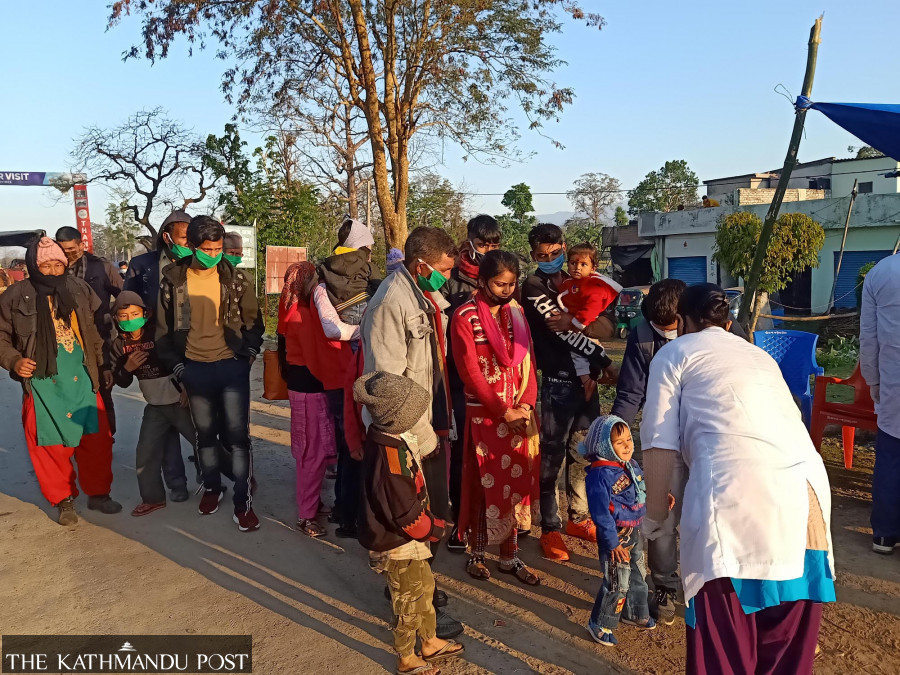Health
Nepal steps up surveillance on the border after fresh coronavirus spike in India
Rise in cases in India cause for concern with uninterrupted cross-border movement every day, doctors say.
Arjun Poudel
The Ministry of Health and Population has stepped up efforts, especially in areas bordering India, to stem the spread of Covid-19 given the uptick in the caseload in some states of the southern neighbour.
Officials of the ministry said they have supplied sufficient numbers of antigen test kits to the health desks set up at border points; directed health workers to collect swab samples of those who test positive on antigen test and send the samples for polymerase chain reaction tests to laboratories equipped to conduct whole-genome sequencing.
“We have also decided to carry out whole genome sequencing of the swab samples that test positive in the polymerase chain reaction tests,” said Dr Shrawan Kumar Mishra, chief of Provincial Health Laboratory in Madhes province. “We have alerted all agencies concerned about the growing risk of a new Covid outbreak.”
India reported a two-fold increase in Covid cases in the last week with 15,700 cases from April 18 to 24 compared to 8,050 cases in the previous week.
At least 12 states of India have been reporting a gradual rise in new Covid cases for the last three weeks.
Haryana, Uttar Pradesh and the national capital Delhi, where to and fro mobility with Nepal is high, accounted for most of the cases.
Although the cause behind the uptick in new cases in India is yet to be determined, experts in Nepal have asked the authorities concerned to be on high alert. The factor driving up the number of cases could be the presence of a new or mutated variant or a decline in immunity in individuals, they say.
“Authorities should step up surveillance measures nonetheless. They should increase testing and enforce safety measures strictly,” said Dr Rajiv Shrestha, an infectious disease expert at Dhulikhel Hospital. “Even though Nepal has not yet recorded a spike in daily new cases, the risk of infection is still high since there is an uninterrupted movement of people across the porous land border between Nepal and India.”
Doctors say an increase in the number of people returning home for May 13 local elections will increase the risk of an outbreak of Covid-19.
The Ministry of Health and Population said that it has issued circulars to all agencies concerned throughout the country to step up surveillance and vigilance to curb the spread of the virus.
“We have alerted all agencies concerned to step up surveillance,” said Dr Samir Kumar Adhikari, joint spokesperson at the Health Ministry. “We are aware of the risk of the new surge in India and have been constantly asking people to adhere to the safety measures such as mask wearing, washing hands and maintaining social distance.”
Experts say the increase in new cases in India could be attributed to the BA.2 subvariant of Omicron and its sub-lineage BA.2.12.1.
The BA.2, a sub-variant of Omicron, was responsible for the third wave of the pandemic in Nepal and even though the impact of the third wave was less severe compared to the second wave driven by the Delta variant, the rate of infection was quite high and worrying.
“Along with stepping up surveillance measures, especially at border points, authorities should conduct whole genome sequencing regularly,” said Dr Sher Bahadur Pun, chief of Clinical Research Unit at the Sukraraj Tropical and Infectious Disease Hospital. “As the SARS-CoV-2 virus is prone to mutations, new variants could emerge within the country.”
Meanwhile, officials at the Health Ministry said whole-genome sequencing has been postponed in laboratories due to a lack of sufficient swab samples of infected people.
“We have not carried out whole genome sequencing since April 10,” Dr Runa Jha, director at the National Public Health Laboratory. “We found the Omicron variant of Covid-19 in previous tests but haven’t been able to carry out another whole-genome sequencing due to lack of sufficient swab samples.”
The Provincial Health Laboratory of the Madhes Province and Dhulikhel Hospital in Kathmandu, which are equipped to carry out whole-genome sequencing also said that they do not have sufficient swab samples to carry out whole-genome sequencing procedure.
“We have not carried out whole-genome sequencing for a long time due to lack of swab samples of infected people,” said Shrestha of the Dhulikhel Hospital, who is also the chief of the whole-genome sequencing programme at the hospital.
The Provincial Health Laboratory of Madhes Province said swab samples collected in December last year showed the presence of Delta variant while Omicron was the dominant variant in swab samples collected in January, February and March this year.
“We are concerned about the new XE variant, and the Deltacron variant but have not found them in swab samples so far,” said Mishra, chief of the Provincial Health Laboratory of Madhes Province.
The XE variant of the coronavirus is also a sub-variant of Omicron. It is a cross between two subvariants of the Omicron variant—BA.1 and BA.2—and is reportedly more infectious.
Nepal on Tuesday reported eight new PCR confirmed coronavirus cases.




 8.54°C Kathmandu
8.54°C Kathmandu















